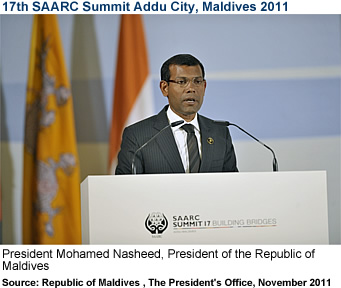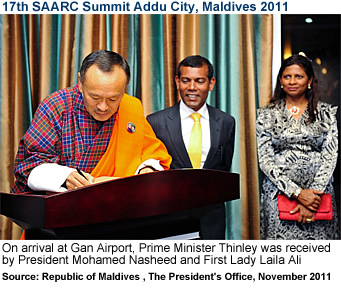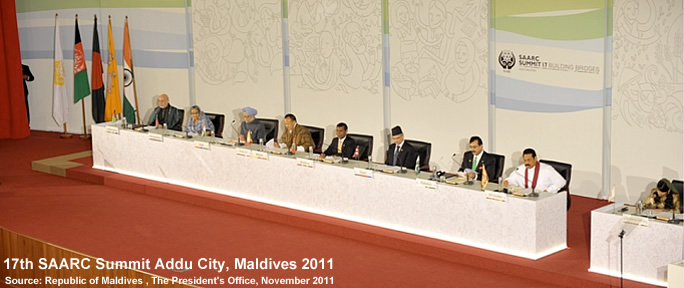| 17th SAARC Summit 2011 - Maldives |
 |
Bhutan Politics |
|
 |
Bhutan Information |
|
|
|
|
17th SAARC Summit 2011 - Maldives
|
 |
10
November 2011
President Nasheed Inaugurates 17th SAARC Summit with Appeal for South Asian Integration
 |
| The President called on SAARC leaders to make progress on three areas of co-operation: trade, transport and economic integration; security issues such as piracy and climate change; and good governance.
In particular, President Nasheed said he hoped nations would agree to fully implement the South Asian Free Trade Agreement and reduce the 'sensitive list' of goods and services countries are currently prevented from trading with one another.
The President also looked to the 17th SAARC Summit to conclude work on a regional ferry service and to agree on a Railways Agreement and a Motor Vehicles Agreement to improve regional transport links. |
|
Furthermore, the President called on SAARC countries to work together to improve maritime security and combat piracy. The President further noted that climate change was the region's greatest long-term security threat and said nations should invest a proportion of national income in clean energy technologies.
President Nasheed also called on SAARC nations to improve good governance by establishing a commission to suggest ways to reduce gender inequality in South Asia. He also advocated for a discussion on establishing a regional mechanism to safeguard human rights.
The President ended his speech on an upbeat note: "The fundamentals of our region are strong. We have young, energetic populations. We live in a region of vibrant democracies, with strong civil societies," he said.
"Let us not be held back by history or convention. Let us change our region for the better. Let us be the leaders our people want us to be. Let's just change the world," the President stated.
11November 2011
President Mohamed Nasheed Highlights the fruitful Results of the 17th SAARC Summit
President Mohamed Nasheed has highlighted the many fruitful results of the 17th SAARC summit, while delivering the closing address at the concluding session of the summit.
Speaking on the trade, transport and economic development issues discussed at the two-day summit, President Nasheed announced SAARC's decision to reduce the sensitive list of Least Developed Countries from 480 tariff lines to 25. He also said that the Heads of State and Heads of Government have agreed to finalize the Regional Railways Agreement and to convene the Expert Group Meeting on Motor Vehicles Agreement, before the next Council of Ministers.
Reflecting on the Security issues deliberated on at the summit, President Nasheed informed of the agreement on the Rapid Response to Natural Disasters and the decision to initiate work on combating maritime piracy in the region. He further said that all countries have agreed to spend an appropriate proportion of their national income on renewable energy technologies.
The President also highlighted the good governance issue on the table at the summit, "We have agreed to convene an expert group meeting to discuss a regional mechanism for empowerment of women and promote gender equality in the region. And we have agreed to strengthen the mechanisms of SAARC itself, including the Secretariat and Regional Centres."
At the concluding session of the 17th SAARC Summit, held from the 10th of November to the 11th in Addu City, SAARC leaders adopted the Declaration of the Seventeenth SAARC Summit as the "Addu Declaration". It was also announced that the Eighteenth SAARC Summit will be held in Nepal.
Following the conclusion of the Summit, President Mohamed Nasheed met with the press in his capacity as the Chairperson of the Summit, and briefed the media on the important decisions taken during the course of the Summit.
President Nasheed called on SAARC leaders to deepen economic integration and build bridges of co-operation between their countries and people, in his inaugural address to the 17th SAARC Summit, which opened this afternoon in Addu City, Maldives.
"South Asia… is becoming more powerful and more prominent than at any other time in our history… the future is ours to shape," the President told the Heads of State, Heads of Government, VIPs and dignitaries assembled in the Equatorial Convention Centre in Hithadhoo.
"For too long, South Asia was considered a sideshow in the theatre of global politics but today, we occupy centre stage. The eyes of the world are upon us. This is our time to shine," he added, in a speech enthused with optimism for the future of SAARC and the region.
"We can only achieve [these] goals, if we work together… because our success, is dependent on our neighbour's success; economic stagnation in one part of our region, dampens prosperity in another; instability in one member state, causes insecurity for us all," the President added.
"We can only make progress if we integrate our economies, ensure our financial system is stable, and foster a political climate that creates confidence," he said.
 |
| Source: Republic of Maldives, The President's Office , November 2011 |
top
| President Nasheed meets Bhutanese Prime Minister |
 |

|
| President Mohamed Nasheed has met with Prime Minister Jigme Thinley of Bhutan 09 November 2011.
At the meeting held at the Addu City State House, discussions were held on the bilateral relations between Maldives and Bhutan, and on ways to further strengthen regional ties.
Bhutanese Prime Minister, spoke on working towards achieving the goals of the SAARC Summit, highlighting this year's theme "Building Bridges". Noting the success of last year's SAARC Summit held in Bhutan, the Prime Minister conveyed his hopes for an equally successful summit this year. |
|
President Nasheed and Prime Minister Thinley also discussed on ways the Bhutanese government could provide assistance in the development of Maldives.
 |
| Source: Republic of Maldives, The President's Office , November 2011 |
top
| more information |
 |
| Links |
 |
 |
 |
External
links |
SOUTH ASIAN ASSOCIATION FOR REGIONAL COOPERATION
SAARC
official
website |
|
 |
|




